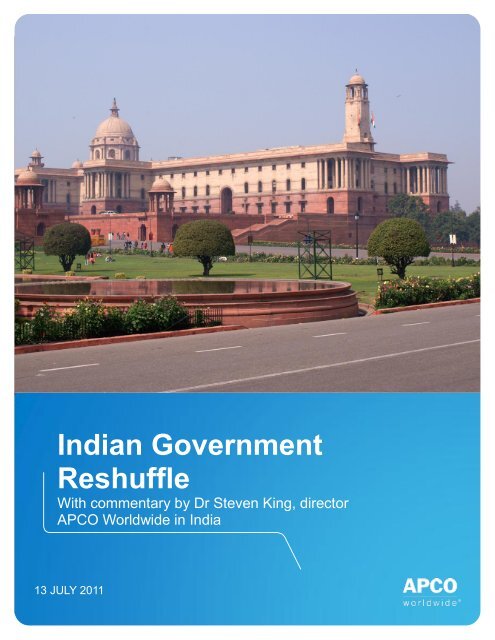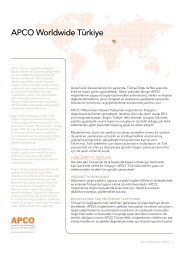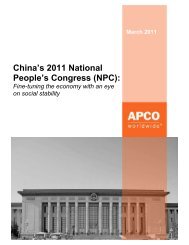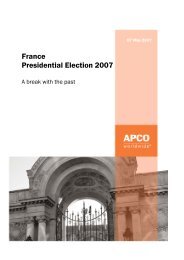Indian Government Reshuffle - APCO Worldwide
Indian Government Reshuffle - APCO Worldwide
Indian Government Reshuffle - APCO Worldwide
You also want an ePaper? Increase the reach of your titles
YUMPU automatically turns print PDFs into web optimized ePapers that Google loves.
<strong>Indian</strong> <strong>Government</strong><br />
<strong>Reshuffle</strong><br />
With commentary by Dr Steven King, director<br />
<strong>APCO</strong> <strong>Worldwide</strong> in India<br />
13 JULY 2011
HIGHLIGHTS OF THE GOVERNMENT RESHUFFLE<br />
� Jairam Ramesh (Congress) was elevated as minister of rural development.<br />
� Jayanthi Natarajan (Congress) will be newly inducted as minister of science with independent charge to<br />
replace him as environment & forests minister.<br />
� Kantilal Bhuria (Congress) lost the tribal affairs portfolio, and V. Kishore Chandra Deo (Congress) is<br />
elevated as minister of tribal affairs & Panchayati Raj.<br />
� Beni Prasad Verma (Congress) was elevated as minister of steel.<br />
� Dinesh Trivedi (Trinamool Congress) was elevated as minister of railways.<br />
� Vilasrao Deshmukh (Congress) was moved to Ministry of Science and Technology and Earth Sciences.<br />
� Commerce and Industry Minister Anand Sharma (Congress) gets an additional charge of the Ministry of<br />
Textiles.<br />
� Murli Deora (Congress) lost the minister of corporate affairs portfolio, and M. Veerappa Moily<br />
(Congress) replaces him.<br />
� Salman Khursheed (Congress) replaces M.Veerappa Moily (Congress) as minister of law and justice<br />
with the additional charge of minority affairs.<br />
� Minister of Parliamentary Affairs Pawan K. Bansal (Congress) gets the additional charge of the Ministry<br />
of Water Resources.<br />
� Dr. M.S.Gill (Congress) lost the Ministry of Statistics & Programme Implementation portfolio.<br />
� Srikant Jena (Congress) was elevated as minister with independent charge for statistics and<br />
programme implementation and as minister of state in the Ministry of Chemicals and Fertilizers.<br />
� B.K. Handique (Congress) lost the minister of development of the north-eastern region (DONER)<br />
portfolio.<br />
� Paban Singh Ghatowar (Congress) was inducted as MoS with independent charge as minister of<br />
development of the north-eastern region (DONER).<br />
� Gurudas Kamat (Congress) was inducted as minister with independent charge for drinking water and<br />
sanitation.<br />
� Milind Deora (Congress) was inducted as minister of state communication and information technology.<br />
� Sudip Bandhopadhyaya (Trinamool Congress) was inducted as minister of state for health and family<br />
welfare.<br />
� Jitendra Singh (Congress) was inducted as minister of state for home affairs.<br />
� Rajeev Shukla (Congress) was inducted as minister of state for parliamentary affairs.<br />
1
� Arun S.Yadav (Congress) has lost the minister of state, agriculture and food processing industries<br />
portfolio.<br />
� Charan Das Mahant (Congress) has was inducted as minister of state, agriculture and food processing<br />
industries.<br />
� Minister of State for External Affairs E. Ahamed (MLKSC) gets the additional responsibility for human<br />
resource development.<br />
� V. Narayansami (Congress) was made minister of state in the prime minister’s office, Department of<br />
Personnel, Public Grievances and Pension. He loses parliamentary affairs.<br />
� Minister of State, Agriculture and Food Processing Industries Harish Rawat (Congress) also gets the<br />
additional charge of minister of state for parliamentary affairs.<br />
Congress: <strong>Indian</strong> National Congress<br />
NCP: Nationalist Congress Party<br />
MLKSC: Muslim League Kerala State Committee<br />
TMC: Trinamool Congress<br />
2
COMMENTARY<br />
Prior to every reshuffle in India, it seems, there are demands, rarely realized, for ―injections of fresh blood.‖ The<br />
average age of those holding the most senior cabinet posts in India – prime minister, finance minister, foreign<br />
minister, home minister and defense minister – was 74 this morning. It remains 74. As widely forecasted, no<br />
changes were made at the very top in the world’s largest democracy where the median age is 25.<br />
In the United Kingdom and United States, the average age of those holding the equivalent posts is 49 and 57<br />
respectively. The median Briton is aged 40, while the median American is 37.<br />
If there is really much of a public demand – as opposed to a media demand – in India that somehow the rulers<br />
should somehow symbolically represent the ruled in demographic terms, it goes unheeded. <strong>Indian</strong>s would point<br />
out that the United Kingdom and the United States have their own issues about sections of society being<br />
represented at the highest level.<br />
Nevertheless, although today’s reshuffle went a little further than some skeptics feared, the United Progressive<br />
Alliance government – whose de facto leader, Sonia Gandhi, is both female and Catholic – can expect to be<br />
dogged by questions as to how in touch it is with the aspirations of India’s youthful population.<br />
The top headline today, however, was a ―no news‖ story. The symbol of the Congress Party’s next generation<br />
and scion of the nation’s first family, Sonia’s son Rahul, remains outside government. If next year’s assembly<br />
elections in India’s most populous state, Uttar Pradesh, are meant to be the launching pad for Rahul to assume<br />
what some regard as his rightful place as head of government, the Gandhis might be disappointed. In <strong>Indian</strong><br />
terms, he has decades on his side, although as Dr Manmohan Singh heads toward seemingly inevitable<br />
retirement, expect one question to be asked increasingly: if now is not Rahul’s time, when is?<br />
The Changes in Detail<br />
Dr Singh has kept his promise from January: the second reshuffle of the year is a weightier affair. Moreover,<br />
there does appear to be a certain logic behind it. States with elections next year, UP in particular, were<br />
favored. Some, but not all, of those with two jobs now only have one, HRD and Telecoms Minister Kapil Sibal<br />
(Congress) being the key exception. Some of the young Congress ministers like Jyotiraditya Scindia, Sachin<br />
Pilot and RPN Singh, who were hopeful of promotion have, however, not been rewarded.<br />
Seven men leave government altogether. Dayanidhi Maran of the DMK party had technically already resigned<br />
after being implicated in the 2G spectrum allocation scam. B.K. Handique (Congress) lost one his portfolios in<br />
January and is now dropped altogether. Dr M.S. Gill (Congress), who was moved in the wake of the<br />
Commonwealth Games fiasco, is finally gone, too. Murli Deora asked to be let go; his son Milind comes into<br />
government as minister of state for communications and information technology. Kanti Lal Bhuria is the other<br />
Cabinet minister to leave, to take on full-time charge of Congress affairs in Madhya Pradesh.<br />
Four individuals were promoted to the Cabinet: Kishore Chandra Deo (Congress) to tribal affairs and<br />
Panchayati Raj; Beni Prasad Verma (Congress) from UP moves up from mines to steel; and, as expected,<br />
Dinesh Trivedi (Trinamool Congress) takes the berth left vacant by his leader, Mamata Banerjee’s election as<br />
chief minister of West Bengal. The other new entrant is Jairam Ramesh (Congress). Many industry voices will<br />
privately welcome the fact that the zealous former environment minister was moved out to be replaced by<br />
Jayanthi Natarajan (Congress) from Tamil Nadu.<br />
Some swapping of portfolios within the Cabinet occurred also. Vilasrao Deshmukh (Congress), who resigned<br />
as chief minister of Maharashtra after the 26/11 Mumbai terrorist atrocities and who was named in the Adarsh<br />
Housing Society scandal, moves to science and technology from rural development. High-profile Veerappa<br />
Moily (Congress), formerly chief minister of Karnataka, loses law and justice to Salman Kursheed (Congress)<br />
from UP who is promoted from water but gains corporate affairs.<br />
3
Two Congress Cabinet ministers gain additional portfolios: Anand Sharma from Himachal Pradesh - which also<br />
has elections next year - adds textiles to commerce and industry, while Pawan Kumar Bansal (Congress) adds<br />
the water portfolio to parliamentary affairs. Whether or not these two individuals will continue to hold two<br />
portfolios for the long-term remains an open question. The suspicion is that some portfolios are being kept<br />
warm for the DMK which did not make nominations this week, as party leader Karunanidhi focuses on<br />
liberating his daughter Kanimozhi from Tihar jail.<br />
One surprise is that while UP has seen its hold on portfolios considerably strengthened, other key states with<br />
elections next year – Gujarat and Punjab – have not. The Nationalist Congress Party, a key UPA component<br />
which lost some traction in January, was not affected by today’s changes.<br />
Impact of the Changes<br />
Halfway through his second term, will these changes restore Singh's reformist image which has<br />
unquestionably been hit by the multi-billion dollar corruption scandals and accusations of drift? That remains to<br />
be seen, but at least the widespread charge made in January – that tainted ministers were just moved around<br />
– has been avoided.<br />
Whether today’s changes, which appear at initial inspection to be motivated mainly by strengthening Congress’<br />
hand within the UPA, will also lead to renewed efforts to tackle the high level of inflation and new economic<br />
reforms is another open question. Rahul Gandhi claims that coalition maintenance makes it difficult to tackle<br />
such problems but his critics would retort that other countries appear to manage.<br />
Bills to overhaul the land acquisition policy, the complex taxation system and liberalise foreign direct<br />
investment rules have suffered lately, dampening market performance and, it has been claimed, disconcerting<br />
investors. With a huge backlog of legislation, some of which dates back to 2004, it will be interesting to see if<br />
the BJP adopts a more ―constructive oppositionalist‖ approach in the next session of parliament to begin on<br />
August 1. Ominous signs, from weaker car sales to a dip in steel imports and FDI, all suggest urgent action is<br />
in order. These signals coincide with global worries that emerging markets could soon hit a financial bump.<br />
The UPA government remains most immediately vulnerable on the question of corruption, however, and the<br />
DMK’s continued support cannot be taken for granted. Senior UPA ministers and the prime minister himself<br />
have been criticized for sending out the wrong message by accusing the comptroller and auditor general of<br />
overreach for bringing various irregularities to light.<br />
Nevertheless, the Congress-led UPA’s strongest card remains a divided opposition. The Left can be in no<br />
mood for an election after its rout in West Bengal earlier this year after 34 years in power. The BJP on the<br />
other hand does not yet appear to have an agreed candidate for prime minister.<br />
Despite the simmering tensions within the UPA, which may or may not been resolved by today’s moves, it<br />
needs to find a narrative which gives some of its policy proposals -- on food security, humane land acquisition,<br />
profit-sharing for communities displaced by mining, making the right to education meaningful — the<br />
appearance of being elements of a wider vision for <strong>Indian</strong> society. Unless some unforeseen disaster befalls the<br />
UPA, there are still nearly three years to run before the next elections and everything to play for.<br />
4
If you would like more information on <strong>APCO</strong> <strong>Worldwide</strong>’s India operations, please contact:<br />
Sukanti Ghosh<br />
managing director<br />
Office No. 421, Level 4<br />
Dynasty Business Park, A Wing<br />
Andheri-Kurla Road, Andheri (East)<br />
Mumbai 400059<br />
India<br />
Phone +91.22.4006.3380<br />
sghosh@apcoworldwide.com<br />
Steven King<br />
director<br />
2nd Floor<br />
255, Okhla Industrial Estate<br />
Phase III<br />
New Delhi 110020<br />
India<br />
Phone +91.11.4605.7777<br />
sking@apcoworldwide.com<br />
Samiran Gupta<br />
executive director<br />
2nd Floor<br />
255, Okhla Industrial Estate<br />
Phase III<br />
New Delhi 110020<br />
India<br />
Phone +91.11.4605.7700<br />
sgupta@apcoworldwide.com<br />
5

















